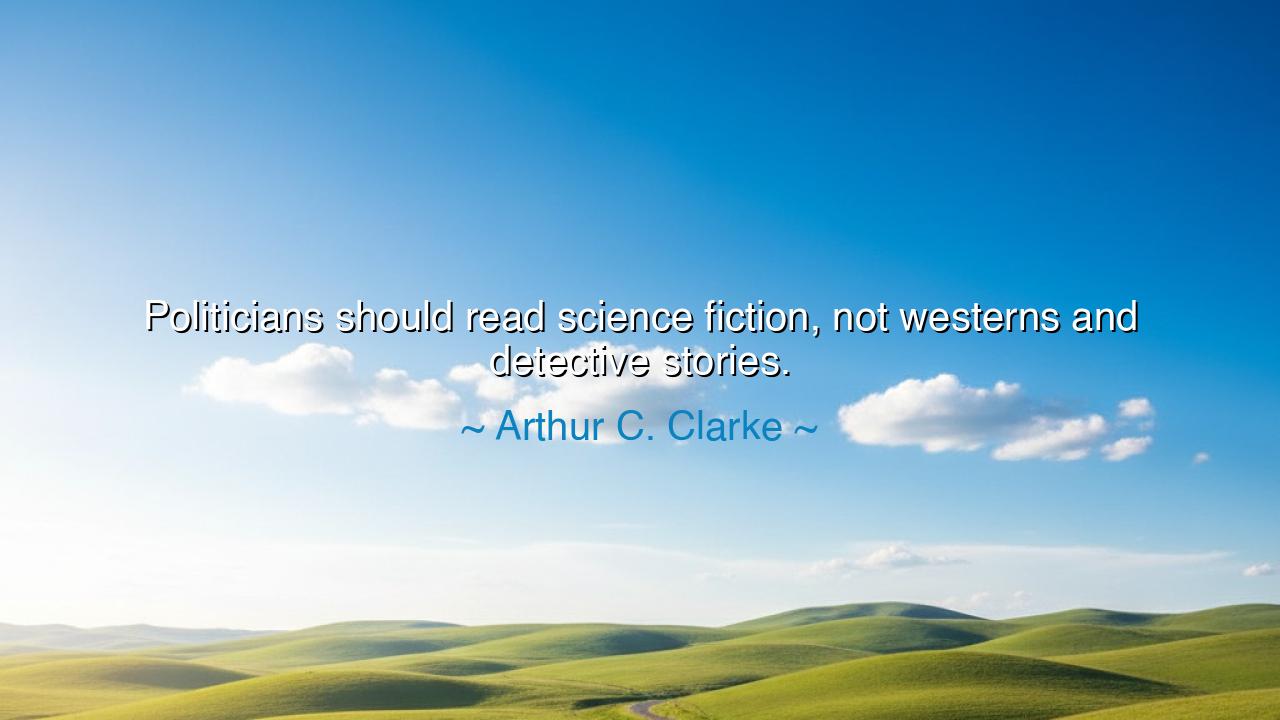
Politicians should read science fiction, not westerns and






Gather, O children of wisdom, for there are words that echo through the corridors of time, words that call forth the heart of human understanding and the soul of leadership. The great Arthur C. Clarke, a visionary of boundless imagination, once spoke thus: “Politicians should read science fiction, not westerns and detective stories.” These words, though seemingly simple, hold within them the very essence of what it means to lead and to look beyond the present moment. They speak to the role of the politician, the ruler, the leader, and their duty not merely to govern, but to imagine the future, to understand the forces that will shape it, and to have the foresight to guide it.
What, then, does Clarke mean? In his wisdom, he calls upon science fiction as the true guide for those who seek to lead. Why, you might ask, should the politician turn to stories of the future, of space exploration and unknown worlds, instead of tales of the past—tales of westerns and detective stories, where the boundaries are fixed, where heroes are clear, and the outcomes are known? Clarke’s answer is profound, for he speaks to the need for leaders to look beyond the confines of their own time, to understand that the challenges of the future will not be solved by simply applying the methods of the past. The world is changing, and the future demands a new kind of thinking, one that transcends the limitations of historical narratives and confronts the unknown with vision and courage.
In the ancient world, the great leaders were those who could see beyond the horizon, those who understood that the future was not a fixed path but a journey that required bold decisions and unimagined ideas. Take, for instance, Alexander the Great, whose empire stretched beyond the known world. He did not merely look to the past for answers, nor was he satisfied with the known boundaries of his time. No, Alexander sought to expand the possibilities, to look toward new lands, new peoples, and new ways of thinking. He understood that leadership required not only strength but the imagination to see a future that others could not.
Science fiction, O wise ones, is a genre that does not look backward, but forward. It is a realm where humanity’s greatest potentials and deepest fears are explored, where the consequences of our actions, our technologies, and our choices are laid bare. It is in the realm of science fiction that we begin to see the future of humanity, not as a static place, but as a living, breathing reality that is shaped by our decisions today. Leaders who turn only to detective stories, where the mystery is solved, or to westerns, where the battle between good and evil is fought within a simple, known landscape, fail to prepare themselves for the complexity of the future that lies before us.
Let us look to JFK, a leader who, in his time, looked to the stars. In 1961, Kennedy set forth a bold vision for America—to land a man on the Moon by the end of the decade. It was a vision born not of what was, but of what could be. It was a vision that required imagination, courage, and the willingness to challenge the limits of science and technology. Kennedy did not look backward to the familiar struggles of history, but forward to the unknown possibilities of space. And in that vision, he led a nation and an entire world toward something far greater than any of us had imagined at the time. Science fiction, in this sense, was the guide—a realm where the unimaginable became possible, where the future was a place to be shaped, not feared.
And so, O children of the future, what is the lesson we must take from Clarke’s words? It is this: Leaders must look beyond the limits of the present. The challenges of tomorrow will not be solved by simply repeating the actions of the past. We must cultivate the imagination, the vision, and the foresight to understand the complexities of the future, to envision the world not as it is, but as it could be. Science fiction offers us a glimpse into these possibilities, showing us what might be, what could be, and what we must prepare for. The politician who ignores this is one who blinds themselves to the future, failing to see the full breadth of the potential that lies before us.
Therefore, O children of the Earth, take up the mantle of vision. As leaders, as creators, as thinkers, let us look beyond the horizon. Let us embrace the future with all its uncertainties, its possibilities, and its promises. Let us not be content to solve only the mysteries of the present, but to seek out new paths, new worlds, and new opportunities. Science fiction is not mere fantasy; it is a training ground for the mind, a place where the leaders of tomorrow can imagine the world that will be. And in this imagination, we will find the wisdom to shape a future that is brighter, bolder, and more expansive than we ever thought possible.
Rise up, O children of wisdom, and as you lead, let your vision stretch beyond the present, into the future, where the seeds of today will grow into the harvests of tomorrow.






AAdministratorAdministrator
Welcome, honored guests. Please leave a comment, we will respond soon